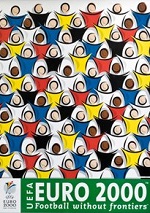|
Background |
Belgium and the Netherlands were selected as co-hosts on 14 July 1995 by
the UEFA Executive Committee at a meeting in Genève, Switzerland |
 |
|
The Draw |
The 16 teams qualifying for
the 2000 European Championship finals competition were divided into
four groups of four teams each for the first round of the final
tournament by
draw held 12 December 1999 in Brussels, Belgium. Pursuant
to the competition's regulations, UEFA seeded four teams as the
heads of the four groups: Belgium and Netherlands as the two host
nations, Germany as the reigning European champion, and Spain as the
highest ranked team in UEFA's
November 1999 European national team ranking table, which
assigned each team a coefficient calculated on the basis of results achieved in the qualifying competitions for the 1998 World Cup
and the 2000 European Championship (excluding the playoff
matches).
After some dithering over how the remaining 12 teams
would be assigned to the four groups, UEFA finally decided, just two
days before the draw, that they, too, would be seeded on the
basis of the UEFA ranking table into three tiers of four teams each.
Ranked 17th in
Europe, England were placed among the teams seeded fourth and lowest, Turkey, Denmark and Slovenia, the only teams in the finals with a
lower ranking than England. The teams seeded second were Romania,
Norway, Sweden and the Czech Republic, and those seeded third were
Yugoslavia, Portugal, world champions France and Italy. The draw
assigned to Group A, headed by Germany, England from the fourth tier of
seeds, Romania from the second tier and Portugal from the
third.
|
Pot 1 (seeded) |
Pot 2 |
Pot 3 |
Pot 4 |
|
Germany |
Czech Republic |
France |
Denmark |
|
Belgium |
Norway |
Italy |
England |
|
Spain |
Romania |
Portugal |
Slovenia |
|
Netherlands |
Sweden |
Yugoslavia |
Turkey |
|
|

 |
|
Group A Table |
|
Team |
P
|
W
|
D
|
L
|
F
|
A
|
GD
|
Pts
|
|
Portugal |
3 |
3 |
0 |
0 |
7 |
2 |
+5 |
9 |
|
Romania |
3 |
1 |
1 |
1 |
4 |
4 |
=0 |
4 |
|
England |
3 |
1 |
0 |
2 |
5 |
6 |
-1 |
3 |
|
Germany |
3 |
0 |
1 |
2 |
1 |
5 |
-4 |
1 |
|
12 June 2000
all times CEST |
6.00pm -
Germany 1 Romania 1
[1-1]
Stade Sclessin, Liege
(28,500) |
Scholl
Moldovan |
8.45pm -
Portugal 3 England 2
[2-2]
Philips
Stadion, Eindhoven (31,500/33,000) |
Figo, Joáo Pinto, Nuno Gomes
Scholes, McManaman |
|
17 June 2000 |
6.00pm -
Romania 0 Portugal 1 [0-0]
Gelredome, Arnhem
(21,000) |
Costinha |
8.45pm -
England
1 Germany 0
[0-0]
Stade Communal, Charleroi
(27,700/30,000) |
Shearer |
|
20 June 2000
both 8.45pm |
England
2 Romania 3
[2-1]
Stade Communal, Charleroi
(27,700/30,000) |
Shearer (pen),
Owen
Chivu, Munteanu, Ganea (pen) |
Portugal 3 Germany 0 [1-0]
Stadion Feijenoord, Rotterdam
(51,504) |
Conceição (3) |
|
ENGLAND ARE ELIMINATED |
|
|
|
|
Group B Table |
|
Team |
P
|
W
|
D
|
L
|
F
|
A
|
GD
|
Pts
|
|
Italy |
3 |
3 |
0 |
0 |
6 |
2 |
+4 |
9 |
| Turkey |
3 |
1 |
1 |
1 |
3 |
2 |
+1 |
4 |
| Belgium |
3 |
1 |
0 |
2 |
2 |
5 |
-3 |
3 |
| Sweden |
3 |
0 |
1 |
2 |
2 |
4 |
-2 |
1 |
|
|
|
|
Group C Table |
|
Team |
P
|
W
|
D
|
L
|
F
|
A
|
GD
|
Pts
|
|
Spain |
3 |
2 |
0 |
1 |
6 |
5 |
+1 |
6 |
|
Yugoslavia |
3 |
1 |
1 |
1 |
7 |
7 |
=0 |
4 |
| Norway |
3 |
1 |
1 |
1 |
1 |
1 |
=0 |
4 |
| Slovenia |
3 |
0 |
2 |
1 |
4 |
5 |
-1 |
2 |
|
|
|
|
Group D Table |
|
Team |
P
|
W
|
D
|
L
|
F
|
A
|
GD
|
Pts
|
|
Netherlands |
3 |
3 |
0 |
0 |
7 |
2 |
+5 |
9 |
| France |
3 |
2 |
0 |
1 |
7 |
4 |
+3 |
6 |
| Czech
Republic |
3 |
1 |
0 |
2 |
3 |
3 |
=0 |
3 |
| Denmark |
3 |
0 |
0 |
3 |
0 |
8 |
-8 |
0 |
|
|
|
|
Second Phase |
|
24 June 2000 |
6.00pm
Turkey 0 Portugal 2 [0-1]
Amsterdam ArenA, Amsterdam
(42,000) |
Nuno Gomes (2) |
 Alpay Alpay |
6.30pm Italy 2 Romania 0
[2-0]
Bruxelles
(40,000) |
Totti, Inzaghi |
 Hagi Hagi |
|
25 June 2000 |
6.00pm Netherlands 6 Yugoslavia 1
[2-0]
Stadion Feijenoord, Rotterdam
(51,504) |
Kluivert (3),
Govedarica OG, Overmars (2)
Milošević |
8.45pm
Spain 1 France 2
[1-2]
Brugge
(30,000) |
Mendieta (pen)
Zidane, Djorkaeff |
|
|
Quarter-Finals |
|
|
|
Semi-finals |
|
28 June 2000 |
8.45pm
France 2 Portugal 1
[0-0]
Golden Goal after 27 minutes
Stade
Roi Baudouin, Bruxelles
(45,000) |
Henry, Zidane
Nuno Gomes |
 Nuno
Gomes Nuno
Gomes |
|
29 June 2000 |
6.00pm
Italy 0 Netherlands 0 [0-0]
AET
[0-0]
& Penalties [3-1]
Amsterdam ArenA, Amsterdam
(51,300) |
|
 Zambrotta Zambrotta |
|
Penalty Shoot-out:-
Di Biagio 1-0, de Boer 1-0, Pessetto
2-0, Stam 2-0, Totti 3-0, Kluivert 3-1,
Maldini 3-1, Bosvelt 3-1.
|
|
|
|
|
The
2000 Final |
|
2 July 2000
8.00pm
|
France 2 Italy 1
[0-0]
AET [1-1]
Golden Goal after 14 minutes
Stadion Feijenoord, Rotterdam
(48,000) |
Wiltord, Trezeguet
Delvecchio |
|
|

|
Notes
For months before the
tournament, the media focused on England's pairing with traditional
rivals Germany, on Germany's drastic decline, on whether England at long
last might achieve their first win in competitive play against Germany
since the 1966 World Cup. Scant attention went to the group's
other two teams. England under Glenn Hoddle had easily beaten
Portugal, 3-0, at Wembley Stadium in an early 1998 friendly, which might
have accounted for cursory dismissal of the Portuguese as a threat, but Portugal had given clear evidence
during their qualifying campaign that their play had improved
immensely. And Romania had beaten Hoddle's England 2-1 at France's
World Cup on a last-minute goal. Yet, as always, England expected, and, in the thrall of
the national debate positing the old enemy as the main threat to
England's chances, it must have been easy to assume England would beat Romania and Portugal.
In the event, England got
their long-awaited win against Germany, 1-0, although the Germans, poor
as they were, still had the better part of the play. But it was no
consolation for the two stunning 3-2 losses to Portugal and Romania that sent
England home early yet again. In both those matches, the
single-goal margin belied the gaping disparity in the
quality of the teams.
It was apparent to observers
with any objectivity that England suffered from glaring deficiencies in
technical skills, relative immobility, alarming defensive
vulnerabilities, tactical naiveté, and rigidity and predictability in
their play--weaknesses and failings that have infected England's game
for decades now. None of the steady and marked
improvements Hoddle made in these areas during his tenure survived his dismissal and the hasty retention, largely for public
relations purposes, of Kevin Keegan, hugely popular yet plainly in far
over his head.
For the first time, the media, which played a
prominent role in ousting Hoddle and warmly greeted his replacement,
subjected Keegan to criticism at once harsh and widespread. Yet
the Football Association, as obdurate as ever in clinging to its
mistakes--or in refusing to admit them-- professed to have continuing
confidence in the beleaguered manager as England prepared for their next
campaign, qualification for World Cup 2002.
|



